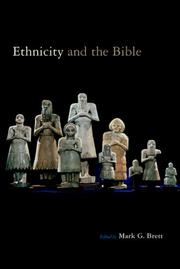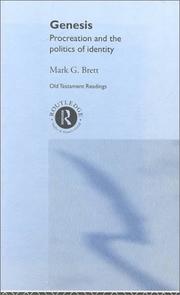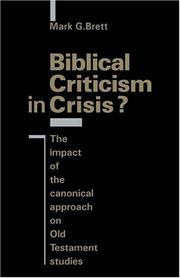| Listing 1 - 10 of 15 | << page >> |
Sort by
|

ISBN: 9004103171 9004493549 Year: 1996 Volume: 19 Publisher: Leiden ; New York Brill
Abstract | Keywords | Export | Availability | Bookmark
 Loading...
Loading...Choose an application
- Reference Manager
- EndNote
- RefWorks (Direct export to RefWorks)
39 <33> --- Ethnicity --- -Ethnology in the Bible --- Ethnic identity --- Group identity --- Cultural fusion --- Multiculturalism --- Cultural pluralism --- Volkenkunde. Zeden en gebruiken. Culturele antropologie--Oud-Palestina. Judea --- Biblical teaching --- 39 <33> Volkenkunde. Zeden en gebruiken. Culturele antropologie--Oud-Palestina. Judea --- Ethnicity in the Bible

ISBN: 0415141508 9780415141505 0415141494 9780415141499 Year: 2000 Publisher: London: Routledge,
Abstract | Keywords | Export | Availability | Bookmark
 Loading...
Loading...Choose an application
- Reference Manager
- EndNote
- RefWorks (Direct export to RefWorks)
This reader combines theoretical perspectives with historical studies in an accessible way. It draws on the politics of identity and places the theological text within a socio-political context.
222.2 --- 222.2 Genesis --- 222.2 La Genese --- Genesis --- La Genese --- Bible. --- Be-reshit (Book of the Old Testament) --- Bereshit (Book of the Old Testament) --- Bytie (Book of the Old Testament) --- Chʻangsegi (Book of the Old Testament) --- Genesis (Book of the Old Testament) --- Sifr al-Takwīn --- Takwīn (Book of the Old Testament) --- Socio-rhetorical criticism.
Book
ISBN: 9780802873071 0802873073 Year: 2016 Publisher: Grand Rapids: Eerdmans,
Abstract | Keywords | Export | Availability | Bookmark
 Loading...
Loading...Choose an application
- Reference Manager
- EndNote
- RefWorks (Direct export to RefWorks)
How can Scripture address the crucial justice issues of our time? In this book Mark Brett offers a careful reading of biblical texts that speak to such pressing public issues as the legacies of colonialism, the demands of asylum seekers, the challenges of climate change, and the shaping of redemptive economies.Brett argues that the Hebrew Bible can be read as a series of reflections on political trauma and healing — the long saga of successive ancient empires violently asserting their sovereignty over Israel and of the Israelites forced to live out new pathways toward restoration. Brett retrieves the prophetic voice of Scripture and applies it to our contemporary world, addressing current justice issues in a relevant, constructive, compelling manner.
Christianity and politics --- Christian ethics --- Postcolonial theology. --- Biblical teaching. --- Australia --- Politics and government --- Postcolonial theology --- 241:22 --- Post-colonial theology --- Theology, Doctrinal --- Christianity --- Church and politics --- Politics and Christianity --- Politics and the church --- Political science --- Biblical teaching --- Moraaltheologie. Theologische ethiek-:-Bijbel --- Political aspects --- Ahitereiria --- Aostralia --- Ástralía --- ʻAukekulelia --- Austraalia --- Austraalia Ühendus --- Australian Government --- Australie --- Australien --- Australiese Gemenebes --- Aŭstralii︠a︡ --- Australija --- Austrālijas Savienība --- Australijos Sandrauga --- Aŭstralio --- Australské společenství --- Ausztrál Államszövetség --- Ausztrália --- Avstralii︠a︡ --- Avstraliĭski sŭi︠u︡z --- Avstraliĭskiĭ Soi︠u︡z --- Avstraliĭskii︠a︡t sŭi︠u︡z --- Avstralija --- Awstralia --- Awstralja --- Awstralya --- Aystralia --- Commonwealth of Australia --- Cymanwlad Awstralia --- Državna zaednica Avstralija --- Government of Australia --- Ḳehiliyat Osṭralyah --- Koinopoliteia tēs Aystralias --- Komanwel Australia --- Komonveltot na Avstralija --- Komonwelt sa Awstralya --- Komunaĵo de Aŭstralio --- Komunejo de Aŭstralio --- Kūmunwālth al-Usturālī --- Mancomunidad de Australia --- Mancomunitat d'Austràlia --- Negara Persemakmuran Australia --- New Holland --- Nova Hollandia --- Osṭralyah --- Ōsutoraria --- Persemakmuran Australia --- Samveldið Ástralía --- Usṭralyah --- Usturāliyā --- Whakaminenga o Ahitereiria --- Κοινοπολιτεία της Αυστραλίας --- Αυστραλία --- Аўстралія --- Австралия --- Австралија --- Австралийски съюз --- Австралийският съюз --- Австралийский Союз --- Комонвелтот на Австралија --- Државна заедница Австралија --- אוסטרליה --- קהיליית אוסטרליה --- أستراليا --- كومنولث الأسترالي --- オーストラリア --- Christianity and politics - Biblical teaching. --- Christian ethics - Biblical teaching. --- Australia - Politics and government - 21st century.

ISBN: 0521401194 052104748X 0511554885 0511832699 Year: 1991 Publisher: Cambridge Cambridge University Press
Abstract | Keywords | Export | Availability | Bookmark
 Loading...
Loading...Choose an application
- Reference Manager
- EndNote
- RefWorks (Direct export to RefWorks)
This book suggests that Old Testament scholars should strengthen their growing links with neighbouring academic disciplines and encourage a number of interpretative interests within biblical studies. Given such a pluralistic context, the author's contention is that the 'canonical' approach to Old Testament study will have a distinctive contribution to make to the discipline without necessarily displacing other traditions of historical and literary inquiry, as many scholars have assumed. Dr Brett offers a comprehensive critique of the canonical approach as developed by Brevard Childs, and examines the development of Childs's exegetical practice, his hermeneutical theory, and the many critical responses which his work has elicited. In responding to these criticisms, the author examines the most problematic aspects of the canonical approach (notably Childs's inadequate reply to those who emphasize the ideological conflicts that lie behind biblical texts in their final form) and seeks to reconstruct the approach in light of contemporary discussions of interpretation in literary theory and the social sciences.
#GGSB: Bijbelse geschiedenis --- #GGSB: Exegese O.T --- 221.06 --- 221.06 Oud Testament: hermeneutiek; exegese --- Oud Testament: hermeneutiek; exegese --- Childs, Brevard S. --- Bible. --- Antico Testamento --- Hebrew Bible --- Hebrew Scriptures --- Kitve-ḳodesh --- Miḳra --- Old Testament --- Palaia Diathēkē --- Pentateuch, Prophets, and Hagiographa --- Sean-Tiomna --- Stary Testament --- Tanakh --- Tawrāt --- Torah, Neviʼim, Ketuvim --- Torah, Neviʼim u-Khetuvim --- Velho Testamento --- Canonical criticism. --- Criticism, interpretation, etc. --- History --- Fiction --- Comparative literature --- Bible OT --- Bijbelse geschiedenis --- Exegese O.T --- Arts and Humanities --- Religion

ISBN: 1134768141 113476815X 9786610254514 1280254513 0203992024 9780203992029 6610254516 9781280254512 0415141494 0415141508 9781134768103 9781134768141 9781134768158 9780415141499 9780415141505 Year: 2000 Publisher: London New York Routledge
Abstract | Keywords | Export | Availability | Bookmark
 Loading...
Loading...Choose an application
- Reference Manager
- EndNote
- RefWorks (Direct export to RefWorks)
Combining insights from social and literary theory as well as traditional historical studies, Mark Brett argues that the first book of the Bible can be read as resistance literature.Placing the theological text firmly within its socio-political context, he shows that the editors of Genesis were directly engaged with contemporary issues, especially the nature of an authentic community, and that the book was designed to undermine the ethnocentism of the imperial governors of the Persian period (fifth century BCE).
Bible. --- Be-reshit (Book of the Old Testament) --- Bereshit (Book of the Old Testament) --- Bytie (Book of the Old Testament) --- Chʻangsegi (Book of the Old Testament) --- Genesis (Book of the Old Testament) --- Sifr al-Takwīn --- Takwīn (Book of the Old Testament) --- Socio-rhetorical criticism.
Book
Year: 1998 Publisher: Leiden: Brill,
Abstract | Keywords | Export | Availability | Bookmark
 Loading...
Loading...Choose an application
- Reference Manager
- EndNote
- RefWorks (Direct export to RefWorks)
Book
ISBN: 1906055378 1906055890 9781906055370 9781906055899 Year: 2009 Publisher: Sheffield Sheffield Phoenix Press
Abstract | Keywords | Export | Availability | Bookmark
 Loading...
Loading...Choose an application
- Reference Manager
- EndNote
- RefWorks (Direct export to RefWorks)
Decolonization --- Religion and ethics --- Biblia --- Postcolonial criticism.
Book
ISBN: 9780190060237 0190060239 Year: 2019 Publisher: New York, NY Oxford University Press
Abstract | Keywords | Export | Availability | Bookmark
 Loading...
Loading...Choose an application
- Reference Manager
- EndNote
- RefWorks (Direct export to RefWorks)
The Hebrew Bible is hardly what might be called a "unified" account of the national history of Israel. The texts, with their myriad genres and competing perspectives, show the forming and re-forming of Ancient Israel's social body in a number of geographical settings. The communities are shown in and out of political power. We read about in-fighting and peace, good kings and bad, freedom and subjugation. Ultimately, the Hebrew Bible is a text about nationhood and empire in the ancient world. Critical reflection on the intersections of religious and political life - which includes such topics as sovereignty, leadership, law, peoplehood, hospitality, redemption, creation, and eschatology - can be broadly termed "Political Theology." In Locations of God, Mark G. Brett focuses primarily on the historical books of the Bible, comparing them with selected prophetic and wisdom books, setting all of them against the lived realities under the shadow of successive empires. Brett suggests that national ideas and their imperial alternatives were woven into the biblical traditions by authors who enjoyed very little in the way of political sovereignty. Using political theology to motivate the discussion, Brett shows us just how the earthly situation of ancient Israel contributed to its theology as reflected in the Hebrew Bible.
Article
Abstract | Keywords | Export | Availability | Bookmark
 Loading...
Loading...Choose an application
- Reference Manager
- EndNote
- RefWorks (Direct export to RefWorks)
Book
ISBN: 0191991546 Year: 2024 Publisher: Oxford : Oxford University Press,
Abstract | Keywords | Export | Availability | Bookmark
 Loading...
Loading...Choose an application
- Reference Manager
- EndNote
- RefWorks (Direct export to RefWorks)
Mark G. Brett the explores the complexities that have emerged in the interactions between biblical interpretation and colonial theories of Indigenous natural rights. This wide-ranging study shows how the legacies of these interactions still shape the laws of property and our understanding of Indigenous rights and responsibilities today.
Bible and law. --- Imperialism. --- Colonies --- Indigenous peoples --- Religion. --- Religion & beliefs. --- Religious aspects. --- Civil rights.
| Listing 1 - 10 of 15 | << page >> |
Sort by
|

 Search
Search Feedback
Feedback About UniCat
About UniCat  Help
Help News
News